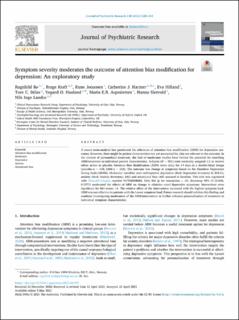| dc.contributor.author | Bø, Ragnhild | |
| dc.contributor.author | Kraft, Brage | |
| dc.contributor.author | Jonassen, Rune | |
| dc.contributor.author | Harmer, Catherine | |
| dc.contributor.author | Hilland, Eva | |
| dc.contributor.author | Stiles, Tore C | |
| dc.contributor.author | Haaland, Vegard Øksendal | |
| dc.contributor.author | Aspesletten, Maria E.B. | |
| dc.contributor.author | Sletvold, Hanna | |
| dc.contributor.author | Landrø, Nils Inge | |
| dc.date.accessioned | 2021-06-23T14:09:32Z | |
| dc.date.available | 2021-06-23T14:09:32Z | |
| dc.date.created | 2021-06-21T21:37:37Z | |
| dc.date.issued | 2021-05-05 | |
| dc.identifier.citation | Journal of Psychiatric Research. 2021, 138, (528-534). | en_US |
| dc.identifier.issn | 0022-3956 | |
| dc.identifier.uri | https://hdl.handle.net/11250/2760939 | |
| dc.description.abstract | A recent meta-analysis has questioned the relevance of attention bias modification (ABM) for depression out- comes. However, there might be patient characteristics not yet accounted for, that are relevant to the outcome. In the context of personalized treatment, the lack of moderator studies have limited the potential for matching ABM-treatment to individual patient characteristics. Subjects (N = 301) were randomly assigned 1:1 to receive either active or placebo Attention Bias Modification (ABM) twice daily for 14 days in a double-blind design (placebo n = 148; ABM n = 153). The outcome was change in symptoms based on the Hamilton Depression Rating Scale (HDRS). Moderator variables were self-reported depression (Beck Depression Inventory-II; BDI-II), anxiety (Beck Anxiety Inventory; BAI) and attentional bias (AB) assessed at baseline. This trial was registered with ClinicalTrials.gov, number NCT02658682. Only BAI (p for interaction = .01, Bootstrap 95% CI [0.046, 0.337]) moderated the effects of ABM on change in clinician rated depressive symptoms. Interactions were significant for BAI scores ≥8. The relative effect of the intervention increased with the highest symptom load. ABM was not effective in patients with the lowest symptom load. Future research should validate this finding and continue investigating moderators of the ABM-intervention to further enhance personalization of treatment to individual symptom characteristics. | en_US |
| dc.description.sponsorship | The Department of Psychology, University of Oslo has also supported the project. | en_US |
| dc.language.iso | eng | en_US |
| dc.publisher | Elseveir | en_US |
| dc.relation.ispartofseries | Journal of Psychiatric Research;volume 138 | |
| dc.rights | Navngivelse 4.0 Internasjonal | * |
| dc.rights.uri | http://creativecommons.org/licenses/by/4.0/deed.no | * |
| dc.subject | Attention bias modifications | en_US |
| dc.subject | Moderators | en_US |
| dc.subject | Depressions | en_US |
| dc.subject | Anxiety | en_US |
| dc.subject | Attentional bias | en_US |
| dc.title | Symptom Severity Moderates the Outcome of Attention Bias Modification for Depression: an Exploratory Study. | en_US |
| dc.type | Peer reviewed | en_US |
| dc.type | Journal article | en_US |
| dc.description.version | publishedVersion | en_US |
| dc.rights.holder | © 2021 The Author(s). | en_US |
| cristin.ispublished | true | |
| cristin.fulltext | original | |
| cristin.qualitycode | 1 | |
| dc.identifier.doi | https://doi.org/10.1016/j.jpsychires.2021.04.027 | |
| dc.identifier.cristin | 1917531 | |
| dc.source.journal | Journal of Psychiatric Research | en_US |
| dc.source.volume | 138 | en_US |
| dc.source.pagenumber | 7 | en_US |
| dc.relation.project | Research Council of Norway: 229135. | en_US |
| dc.relation.project | The South East Norway Health Authority Research Funding: 2015052 | en_US |

